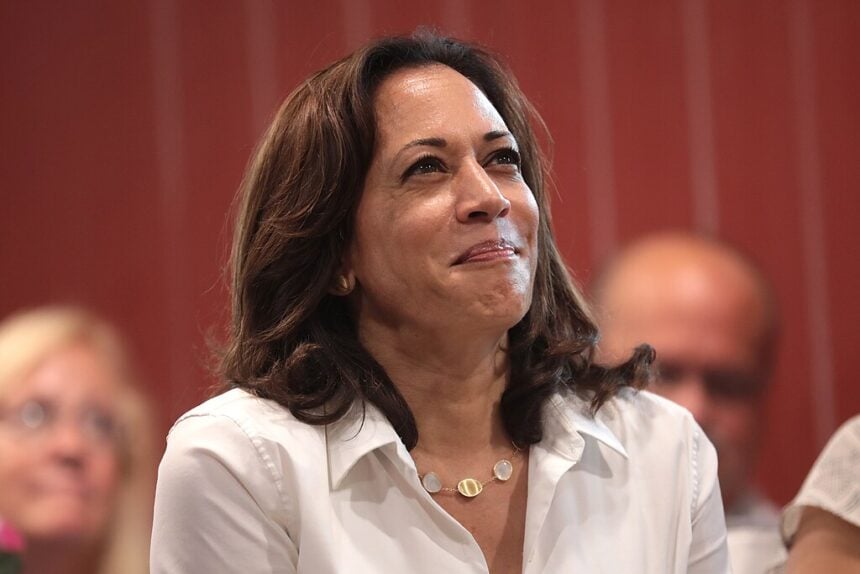“I’m so excited to see that kind of representation,” gushed Meghan Markle when Kamala Harris was running alongside Joe Biden to be vice president in 2020, telling feminist icon Gloria Steinem, “You know, for me, being biracial … you need to see someone who looks like you in some capacity.” In the last presidential election, in other words, the main value of the first woman of color to be nominated on a presidential ticket was in her race and gender, characteristics that two leftist women celebrities proudly embraced under the ideology of “diversity, equity, and inclusion” (DEI). President Joe Biden appears to agree, saying at a campaign rally as recently as May 2024 that he was “proud to have the most diverse administration in history,” adding that “it starts at the top with the vice president.”
Fast forward to last week and see where that sort of talk will get you. As soon as Kamala Harris secured the Democratic nomination for president last week, her critics were sharply put on notice that any suggestion Harris had been chosen for her race and gender would be considered inherently racist and misogynist—in other words, it’s considered unacceptable grounds for criticism. Democratic Congressman Maxwell Frost (D-Fla.) called the phrase “DEI hire” a “racial slur,” a “racist dog whistle,” and the equivalent to using the “N-word,” even though no one has advanced any logical argument to substantiate that observing an individual having benefited from unfair DEI-based racial or gender preferences equals an attack on that individual for his race or gender.
Regime media quickly entered the fray, however, with CNN moralizing that DEI criticism “traded on familiar racist tropes about women of color—especially black women—in the workplace.” In the days that followed, even calling Harris “incompetent”—a common accusation in U.S. political races at every level—came under fire, with CNN commentators Van Jones and Ashley Allison insisting that the term is inherently racist when applied to black women and therefore off limits for critics of Kamala Harris.
Slavishly committed to preserving their junior memberships in the governing uniparty, within 48 hours of Biden’s endorsing Harris to succeed him establishment Republicans obediently lapped up these admonitions and attempted to impose them on their own colleagues, some of whom had already accurately called Harris a “DEI hire.” Last Tuesday, the GOP’s congressional leadership instructed its members to confine their criticisms of Harris to her “record” and avoid any mention of the undisputed fact that she was a DEI pick, chosen by Biden as his running mate after he announced at a 2020 Democratic primary debate that he would choose a woman and subsequently adding that he would choose only a black woman, in exchange for crucial black political support. He then chose Harris, who had called off her own campaign for that year’s Democratic nomination for lack of funds and amid dismal polling.
The day after the House GOP’s craven move, the stuffy editorial board of the reliably anti-Trump Wall Street Journal agreed, calling the DEI charge a “bad argument,” even while curiously admitting that in 2020 it “may literally have been true.” Somnolescent Forbes got into the act, publishing a preachy essay by a “Harvard-trained Professor of Inclusive Global Leadership” who, while conceding that Harris’s rise has been “improbable,” warned her readers that criticizing underqualified or unqualified minorities or women as “DEI hires” is “disparaging” and results from “deeply ingrained, often unconscious societal biases” that can be measured by an online “implicit bias” test, which she recommended her readers take (no, thanks). “It’s not helpful,” failed 2024 Republican primary candidate Nikki Haley conceded when CNN asked her about DEI-based criticisms of Harris.
Some Republican bureaucrats agree. Whitley Yates, who serves as the Indiana state GOP’s “director of diversity and engagement” (if you can imagine such a thing) insisted to The Hill that Republicans should “absolutely” avoid criticizing Harris as a DEI candidate, calling such remarks “terrible detrimental things” that “will drive people away.” According to recent polls, however, President Trump, who has consistently criticized DEI since his last administration, has made unprecedented gains for a Republican presidential candidate among minority voters, with over 30 percent of blacks recently saying they plan to vote for him in November, far exceeding any previous GOP candidate and also outdoing his own record minority support in 2016 and 2020.
“This should not be about personalities. It should be about policy,” House Speaker Mike Johnson told Politico defending his instructions to congressional Republicans last week, “and I think in that comparison, we’ll win in a landslide.” Johnson may wish to consult the polls, which now show Harris having nearly eliminated Trump’s lead, nationally and in most swing states, even as the Republicans struggle to find an effective strategy to compete with Harris.
In any objective world, it is beyond question that Kamala Harris owes her current position, and possibly earlier ones, to nothing more than her pigmentation and genitalia. Americans overwhelmingly agree that race-based preferences are wrong, with 68 percent—and even 52 percent of blacks—favoring the Supreme Court’s decision last year to ban affirmative action in college admissions. Meanwhile, DEI has become a national bad word, with state governments and private companies steadily ousting related programing and personnel from their organizations. Companies that cling to it, on the other hand, have lost billions of dollars to public backlash, shoddy output, and general unpopularity. If anti-DEI criticism is good enough for Miller Lite promotions or Netflix content, it is good enough for presidency of United States and it is high time Republicans start saying so.

Leave a Reply